Key takeaways:
- Understanding feedback as a valuable tool for growth fosters a more open and collaborative work environment.
- Adaptability and effective communication are vital skills that enhance productivity and project outcomes.
- Proactively seeking feedback encourages ongoing improvement and strengthens team dynamics.
- Setting defined career goals and embracing lifelong learning can lead to significant personal and professional development.
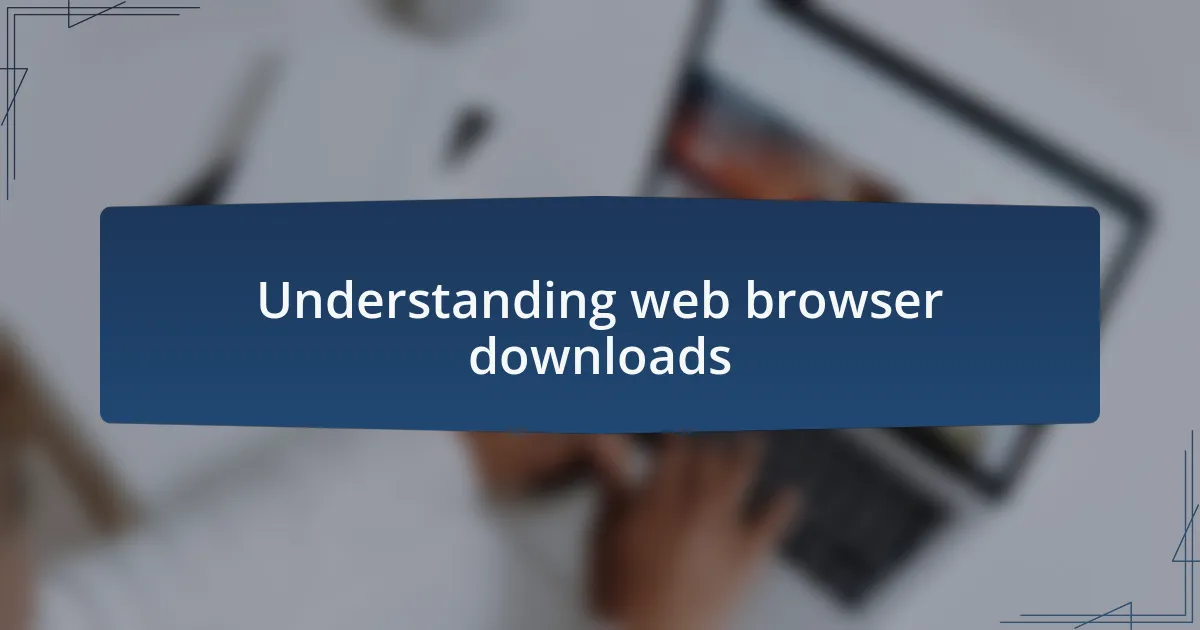
Understanding web browser downloads
Understanding web browser downloads can be quite a journey. I still remember the first time I downloaded a file, feeling a mix of excitement and anxiety. Would it be what I expected? This sense of anticipation is common for many users navigating the digital landscape.
When you click that download button, it’s more than just a simple action; it’s a complex orchestration between your browser, the server, and your device. I learned that each download involves a series of protocols working behind the scenes that I hadn’t considered before. Have you ever thought about how all those processes come together seamlessly? It’s fascinating to think how often we take this for granted.
As I navigated through various downloads, I noticed how different browsers handle files uniquely. Some might pause unexpectedly, prompting frustration, while others streamline the experience with ease. Reflecting on these experiences, I began to appreciate the value of knowing which browser suits my needs best to enhance my downloading efficiency. Isn’t it interesting how these seemingly small details can significantly shape our user experience?
Analyzing my manager’s feedback
Receiving feedback from my manager was eye-opening. I specifically remember a time when they pointed out how my attention to detail could be refined. It made me realize that while I pride myself on thoroughness, being overly focused can sometimes slow down productivity. Have you ever experienced that tug-of-war between perfection and progress?
As I delved deeper into their insights, I started to identify patterns in my work habits. For instance, my manager noted that my reports, while comprehensive, often lacked a concise summary, making it hard for stakeholders to grasp the key takeaways quickly. This feedback pushed me to adopt a new approach—thinking about clarity and brevity first. I found that summarizing key points not only enhanced communication but also made my efforts feel more impactful. Isn’t it surprising how a small adjustment can lead to a big difference?
Reflecting on these discussions led me to embrace a growth mindset. My manager emphasized that feedback is not a critique but a valuable tool for development. I realized that viewing feedback in this light not only eases the pressure but helps foster a more open, collaborative environment in the workplace. Have you noticed how a shift in perspective can change the way you engage with constructive criticism?
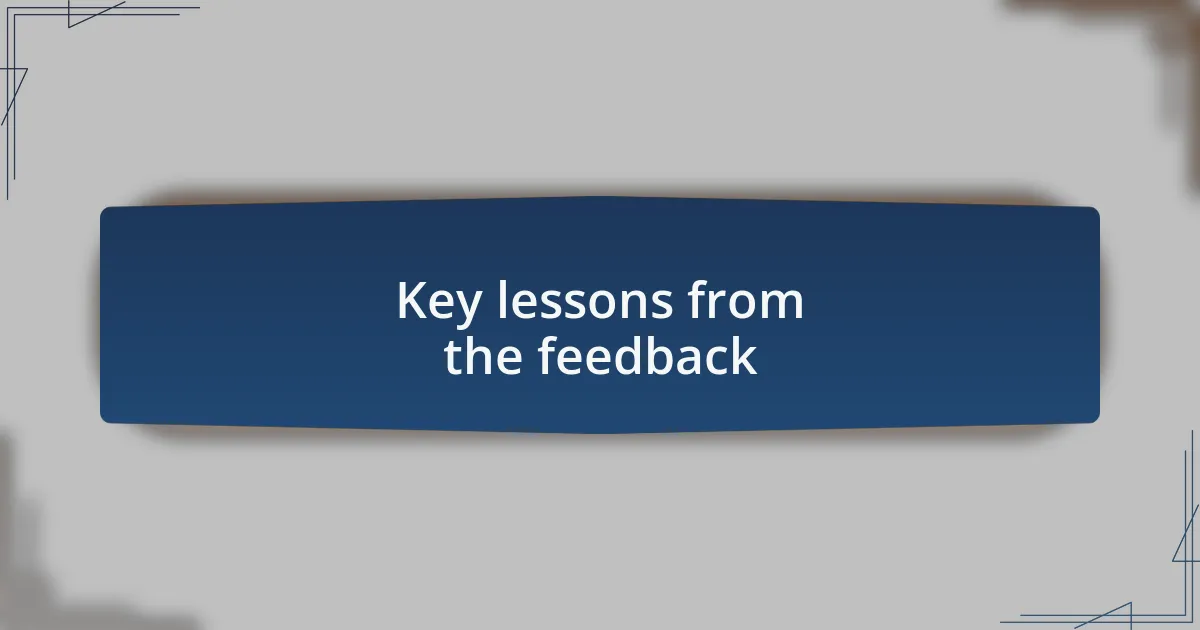
Key lessons from the feedback
Key lessons from the feedback
One significant lesson I took away from my manager’s feedback is the importance of adaptability. I recall a project where I had a rigid plan in place, and my manager advised me to stay open to changes as feedback came in. Initially, I resisted this idea, but as I adjusted my approach, I found that incorporating ongoing insights led to a much better outcome. Have you ever realized that flexibility can turn a potential setback into an opportunity for growth?
Another key takeaway was the value of effective communication. My manager pointed out that I often provided thorough analyses without fully considering my audience’s needs. This was a bit of a wake-up call for me. I remember revising a report based on that advice, adding visuals and simpler language, and the positive responses from my colleagues were incredibly gratifying. It’s fascinating how being aware of who you’re communicating with can elevate your overall effectiveness, isn’t it?
Lastly, my manager highlighted the importance of seeking feedback proactively rather than waiting for formal reviews. This shift in strategy has empowered me to engage in ongoing conversations with my peers and supervisors. I think back to a time I reached out after a team project to gather insights; the feedback I received not only improved my future work but also strengthened our team’s bond. Have you considered how a simple question can lead to richer collaboration?
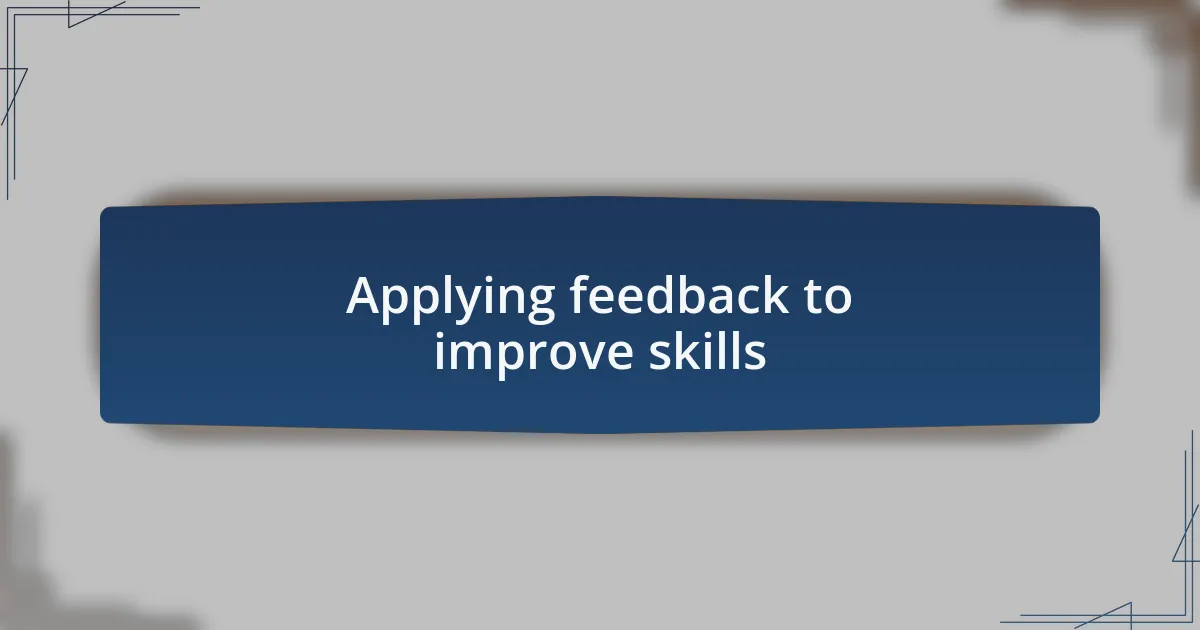
Applying feedback to improve skills
Applying feedback to improve skills
When I started applying my manager’s feedback on organizing my workflow, I noticed a remarkable shift in my productivity. I used to jump into tasks without a clear structure, which often led to frustration. After I embraced the advice to prioritize tasks based on urgency and importance, I felt a sense of control I hadn’t experienced before. Isn’t it amazing how a little guidance can transform chaos into clarity?
Feedback also pushed me to hone my technical skills, particularly in web design. A recommendation from my manager encouraged me to explore new design tools, which at first felt overwhelming. But as I dove into learning them, I discovered a passion for creating user-friendly interfaces. The thrill of seeing my designs resonate with users was exhilarating. Have you ever discovered a hidden talent simply by stepping outside your comfort zone?
Moreover, I learned that applying feedback requires consistent reflection. One time, my manager suggested I keep a journal of my projects and the feedback received. Initially, the idea seemed tedious, but it turned out to be a powerful tool for my growth. Looking back, I could see patterns in my work habits and areas for improvement. Isn’t it interesting how tracking our progress can illuminate our journey and foster growth?
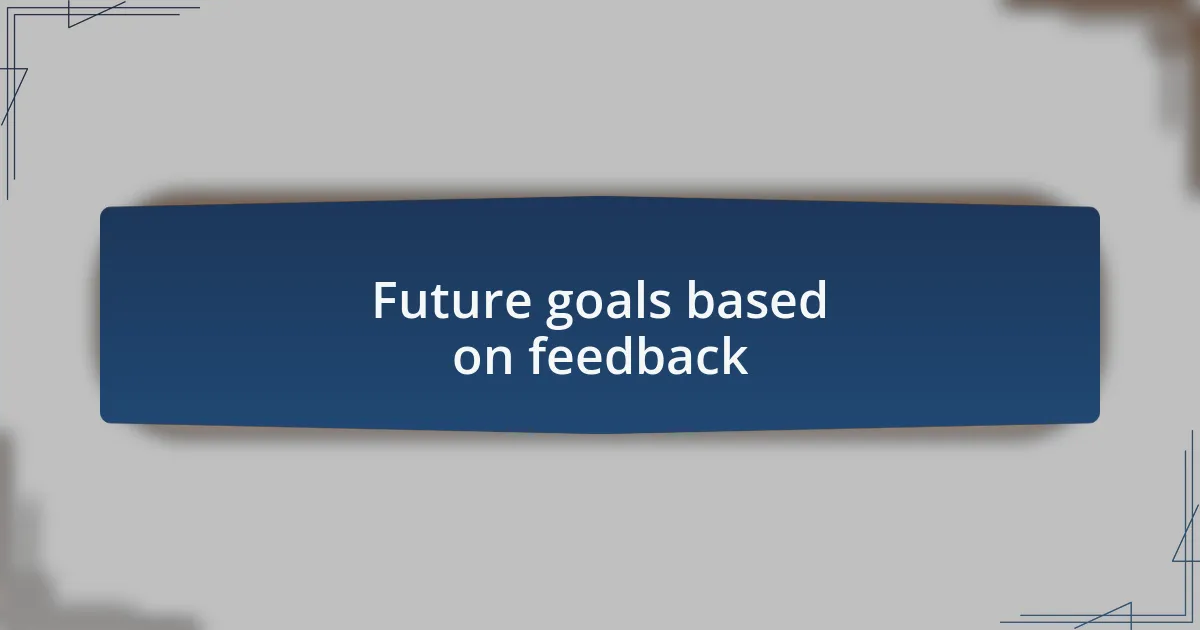
Future goals based on feedback
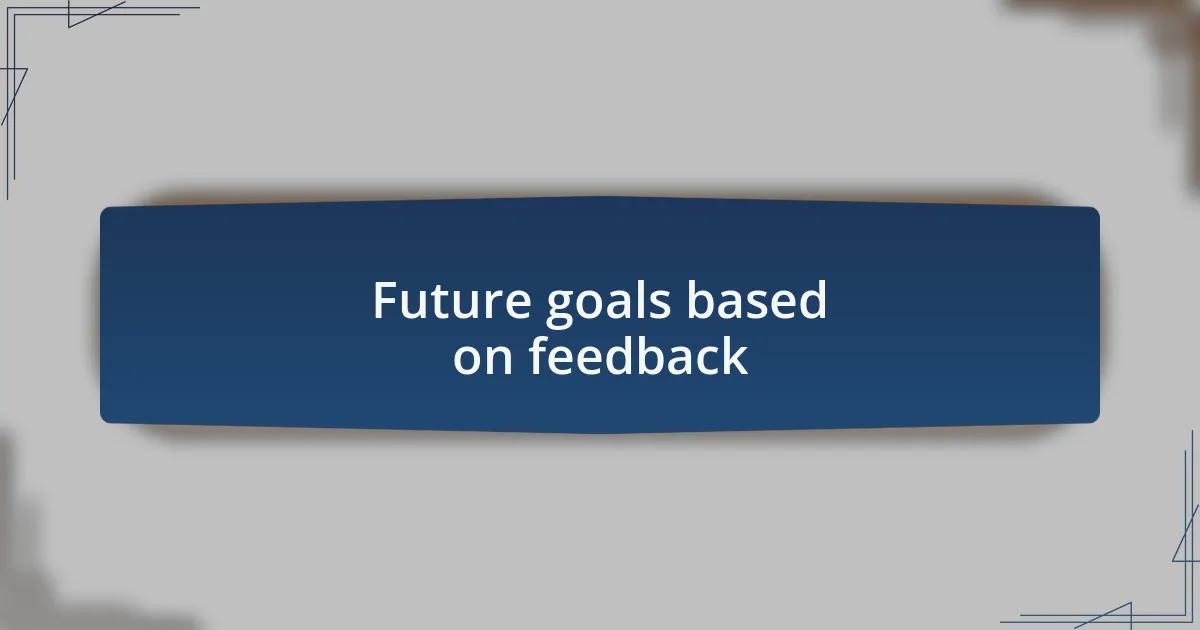
Future goals based on feedback
Future goals based on feedback
Receiving feedback from my manager has sparked a desire to set more defined goals for my career trajectory. For instance, one piece of advice I took to heart was to seek leadership opportunities within projects. This motivated me to aim for roles where I can not only contribute technically but also guide a team. Have you ever thought about how stepping into a leadership role could change your perspective on project management?
In addition to seeking leadership, I now aspire to expand my skill set into areas like user research and data analysis. My manager pointed out that understanding user behavior is crucial for effective design. This insight shifted my focus; I began taking online courses to delve deeper into these subjects. How often do we overlook the potential to grow simply because we stick to what we know?
Finally, I plan to implement regular check-ins with my manager to discuss my progress toward these goals. This practice not only keeps me accountable but also opens the door for ongoing feedback. I can’t help but wonder, how can we evolve if we don’t regularly assess our growth with the support of others? Engaging in this dialogue feels like having a map for my journey, guiding me toward continuous improvement.
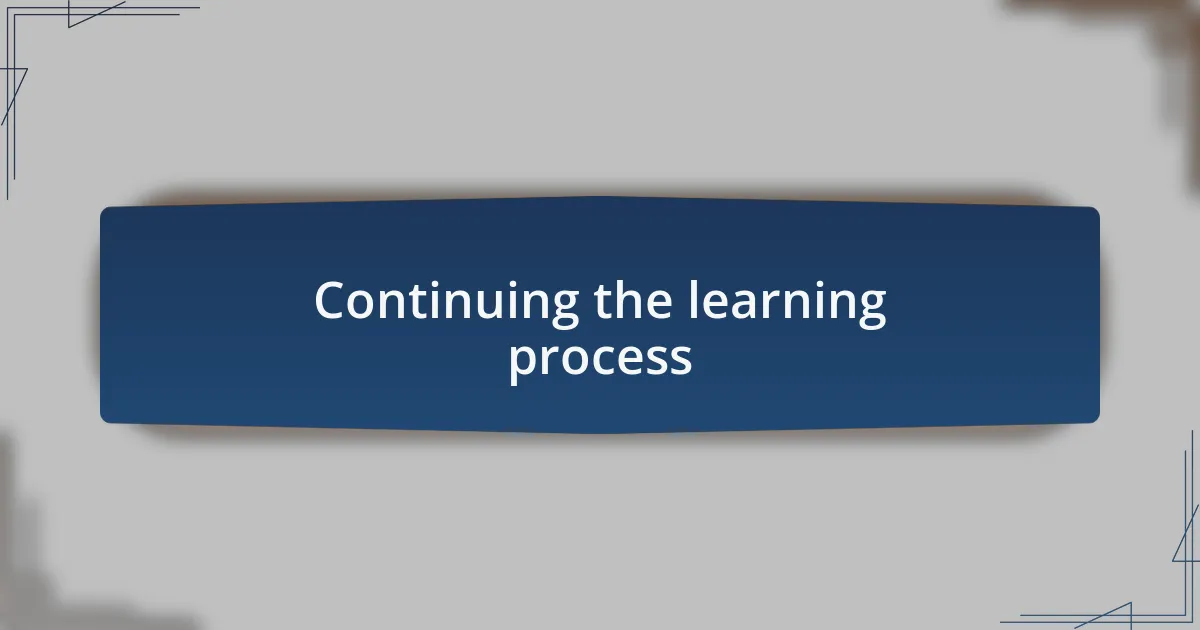
Continuing the learning process
There’s a certain thrill that comes with the idea of lifelong learning. I recall a project where I initially struggled with feedback on my approach. Instead of feeling discouraged, I chose to view it as an opportunity. When I consciously sought to learn from those moments, I noticed my skills and confidence growing—have you ever turned a setback into a stepping stone?
The process of continuing to learn is not just about acquiring new skills; it’s about reflecting on past experiences. For instance, after a challenging project, I sat down to analyze what went well and what didn’t. This introspection allowed me to identify patterns in my work habits and recognize areas for improvement. How many times do we actually take stock of what we’ve learned from past experiences?
I find that sharing insights with colleagues enhances my learning journey, too. During a recent team meeting, we discussed our individual growth stories, and I was fascinated to discover how differently we all approached feedback. It struck me that every conversation is a chance to glean something valuable. Don’t you think that collaboration can often unveil new perspectives that we might not see on our own?